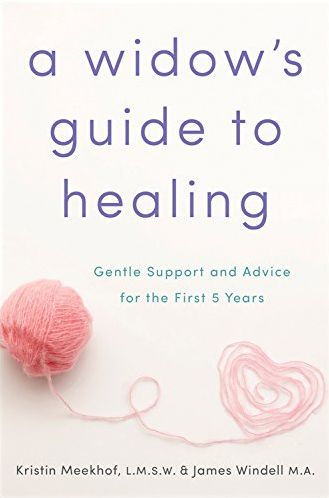Social support is a critical element of healing for bereaved partners, and having a strong network gives healing to grief. In conducting interviews for my book A Widow's Guide to Healing: Gentle Support and Advice for First 5 Years, I was pleased to hear how many widows told me that they survived the death of their spouse because of the wonderful support that they received from their family and friends.
For instance, Marilyn (not her real name) who was in her seventies when her husband died, said very simply, "I had an awful lot of emotional support from my family and friends." She also said that she and her husband had been very active in their church prior to his death "I had so many friends," Marilyn said, "I never sat around feeling sorry for myself. I had no reason to. With my children, grandchildren, and friends, life is good."
Jane (not her real name) in her late fifties when her husband died from a heart attack, credits her family for her recovery. "I was lonely," she says, "but maybe that never goes away. After all, you figure you are going to grow old together- you know, the companionship you'll both share forever. But all three of my children were still at home when he died, and that helped a lot."
However, some widows, while acknowledging the importance of supportive friends, found their families less helpful. Some even faced hostility, anger, rejection, and spitefulness on the part of in-laws and other relatives. Other conflicts with family can escalated over money. Some widows were even sued by their step- children over the estate.
Viola (not her real name) age 40 who had no children said, "I felt like they (my husband's family) treated my husband's death like a divorce. Slowly, the invitations to family gatherings ended. At first, I thought it was my imagination, and then I would see things on social media. They had parties and dinners that I wasn't invited to. My heart would sink every time I realized I wasn't included. I wasn't prepared for this loss too."
Relationships with in-laws can be tricky, and at times downright complex and stressful. This is just as true prior to the death of a spouse as it is afterward. How long one dated, the length of the engagement, and how soon one married after meeting can ll play a part in determining what type of relationship one will have with the deceased spouse's family.
The loss of social support can be considered a secondary loss. The primary loss was the death of the spouse, and losses that stem from this are considered a secondary loss.
Sometimes friends perceive a couple as one unit and when that couple is just one the remaining person is no longer invited to social events. This can be just as painful. Exclusion can sting.
 If one finds that some of their relationships become fractured after their loss, be aware that one's own actions can contribute to deepening these breaks. Be careful not to overreact to the signs of deterioration. Although it is not fair that one's partner died and others are seemingly punishing one for it, overreacting will generate an intense amount of stress and will only make matters worse. Sadly, some relationships do not survive post loss. The bereaved may find relief in attending a support group and / or confiding in a trusted friend. Seeking support from a licensed therapist can also provide additional help and insight.
If one finds that some of their relationships become fractured after their loss, be aware that one's own actions can contribute to deepening these breaks. Be careful not to overreact to the signs of deterioration. Although it is not fair that one's partner died and others are seemingly punishing one for it, overreacting will generate an intense amount of stress and will only make matters worse. Sadly, some relationships do not survive post loss. The bereaved may find relief in attending a support group and / or confiding in a trusted friend. Seeking support from a licensed therapist can also provide additional help and insight.
Kristin Meekhof, LMSW is the author of "A Widow's Guide to Healing: Gentle Support and Advice For The First 5 Years." She is grateful to Deepak Chopra, MD, FACP and Maria Shriver for their cover blurbs. She is a graduate of Kalamazoo College and completed the MSW program at the University of Michigan. Her husband died from advanced adrenal cancer in 2007 when she was 33.
Parts of this piece contain excerpts from the book "A Widow's Guide to Healing" (Sourcebooks, 2015). May not be reprinted without direct permission from Sourcebooks.
This post is part of Common Grief, a Healthy Living editorial initiative. Grief is an inevitable part of life, but that doesn't make navigating it any easier. The deep sorrow that accompanies the death of a loved one, the end of a marriage or even moving far away from home, is real. But while grief is universal, we all grieve differently. So we started Common Grief to help learn from each other. Let's talk about living with loss. If you have a story you'd like to share, email us at strongertogether@huffingtonpost.com.